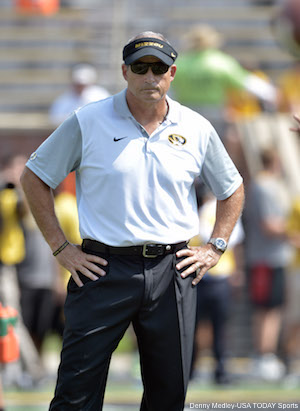People often ask why I write about sports. They say I could be doing a greater service writing about "real life issues" and not games played by millionaires. Sports, they say, are unimportant.
Students at the University of Missouri disagree. On Saturday night, more than 30 players went on strike by refusing to participate in football-related activities as long as Tim Wolfe remained university president. Racial tensions, along with student and faculty protests, have gripped the campus, as Wolfe was criticized for mishandling a series of racist incidents in recent months.
Sophomore defensive back Anthony Sherrils announced the strike on Twitter.
We're black. Black is powerful. Our struggle may look different, but we are all #ConcernedStudent1950 pic.twitter.com/obCjSWCFVY
— HeMadeAKing (@1Sherrils_2MIZZ) November 8, 2015
On Sept. 12 Payton Head, an African-American senior and president of the Missouri Students Association, claimed to have been repeatedly called the N-word by students in the back of a pickup truck. After another a month of sporadic racist incidents, ConcernedStudent1950, a group at MU (African-American students were first admitted to the school in 1950), stopped President Wolfe's car at the Oct. 10 homecoming parade. They were dispersed by police.
In the ensuing month, ConcernedStudent1950 called for a series of demands (including Wolfe's exit from office).
Then on Oct. 24, a swastika made of human feces showed up on a resident hall bathroom wall. ConcernedStudent1950 met with Wolfe and a graduate student, Jonathan Butler, announced he was going on a hunger strike until Wolfe's removal from office.
For two months, Missouri students chipped away at the roots of racism. On Saturday, the football team took out a chainsaw. The school's biggest moneymaker gave Wolfe an ultimatum. If this week's game against BYU were canceled, it would cost Missouri the considerable revenue that comes with a home game -- plus a $1 million penalty payment to the Cougars.
Worth repeating: Missouri would owe BYU $1 million dollars if the game is canceled, according to the game contract.
— Tod Palmer (@todpalmer) November 8, 2015
On Monday morning, Wolfe resigned as president of the University of Missouri system.
We live in an American society that does not see progress until celebrities, athletes and entertainers take a stand. Butler went on a hunger strike, but Wolfe did not resign until a Missouri home game was threatened.
The football players deserve credit. Remember, these are the same kids who embraced Michael Sam two years ago when he announced he is gay. They witnessed the Ferguson unrest one year ago and saw their university overcome with racist conflict this year. They put their scholarships and reputation on the line to fight for a cause, and even more importantly, to progress the ideals of fellow students outside of football. Missouri's student body is 7 percent black. Of the school's 84 scholarship football players, 58 are African-American. The football players had the leverage, in numbers and in finances, that the students did not.
In the immediate aftermath, junior cornerback John Gibson insisted the black players had not pressured white coaches to join their fight.
@EdgeofSports has nothing to do with our coaches. Our coaches are 100% behind us. Including the white ones
— John Gibson III (@thatgibsonkid) November 8, 2015
White offensive lineman Paul Adam also gave his public approval.
Nothin but respect for my brothers... I love y'all
— Paul Adams (@PaulAdams64) November 8, 2015
Coach Gary Pinkel posted a photo of the entire team together.
The Mizzou Family stands as one. We are united. We are behind our players. #ConcernedStudent1950 GP pic.twitter.com/fMHbPPTTKl
— Coach Gary Pinkel (@GaryPinkel) November 8, 2015
Pinkel, with a salary of $4.02 million per year, is the highest paid public employee of Missouri. Despite the photo, there might have been some cracks in the team's unity.
"As much as we want to say everyone is united, half the team and coaches -- black and white -- are pissed," an anonymous white player told ESPN Monday morning (before Wolfe's resignation). "If we were 9-0, this wouldn't be happening."
Maybe that is the truth. I covered Northwestern during Kain Colter's fight for unionization and there were players on the team who felt the labor effort was an unnecessary sideshow. After all, Missouri's players came to Columbia to be football players, not politicians. Missouri is 4-5 (1-5) after two straight SEC East crowns, so activism can turn attention from a forgettable season.
The fact that African-Americans comprise a majority on the Missouri football team, but make up a fraction of the student body cannot be ignored. In 2015, in Columbia, Missouri, the football players, not student groups, have the political power. Maybe that will change one day, but for now, this is how things are. And those players came through.
Dave Zirin of The Nation reminds us former Ohio State President Gordon Gee once referenced the power of college football saying of former head coach Jim Tressel, "I hope he doesn't fire me." This week, the Missouri football team fired Wolfe.
In last spring's NFL Draft, six Tigers were picked, tied for sixth-highest among all programs, so this team includes players with NFL aspirations. But the players saw themselves having greater societal value, and they used their stature to leverage change.
After all, sports are important.
-- Follow Jeffrey Eisenband on Twitter @JeffEisenband.






